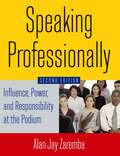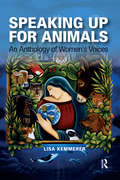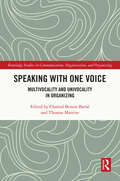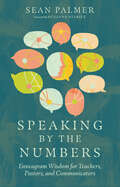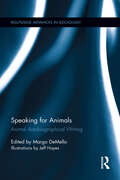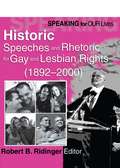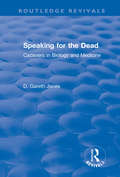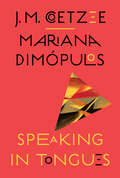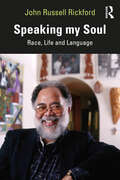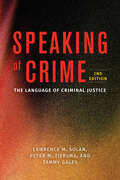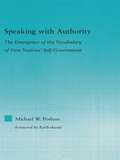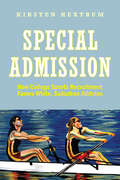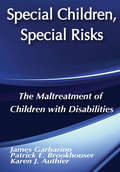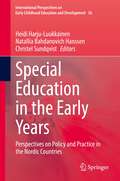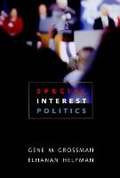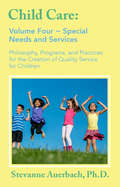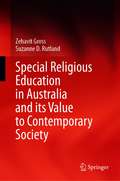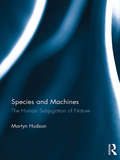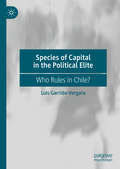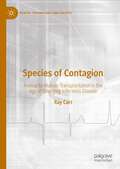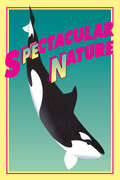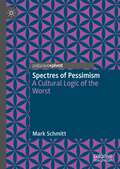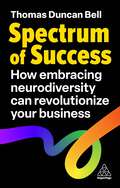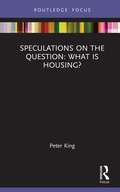- Table View
- List View
Speaking Professionally: Influence, Power and Responsibility at the Podium
by Alan Jay ZarembaUpdated with new and current examples throughout, this concise guide is a rich resource for anyone who wants to become more effective in speaking settings. It covers all the basics and identifies essential principles that will help readers to efficiently prepare, deliver, and evaluate presentations.
Speaking Up for Animals: An Anthology of Women's Voices
by Lisa KemmererSpeaking Up for Animals highlights eighteen courageous members of a growing international animal advocacy movement that is overwhelmingly powered by women. These remarkable activists take us with them as they lift factory farmed chickens and cows from quagmires of filth, free gigantic sea lions caught in fishing gear and secure undercover footage of dogs crying for mercy on stainless steel vivisection tables. In the process, these dedicated women expose the many ways that most of us are complicit in the suffering and exploitation of animals, and creatively suggest a variety of ways in which we might help bring change.
Speaking With One Voice: Multivocality and Univocality in Organizing (Routledge Studies in Communication, Organization, and Organizing)
by Chantal Benoit-Barné Thomas MartineThis book explores the dynamics and challenges that underlie the ability of organizations to speak with one voice. Contributions by experienced and emerging scholars shed light on the nature and regulation of the communication processes whereby the many and diverse voices of a collective can unite, act, and speak as a distinct entity, thus contributing to its organizing. By focusing on communicational events, whether in the context of for-profit and non-profit organizations, political protests or social movements, chapters guide the reader through the diverse manifestations and concrete ways of dealing with the imperative for organizations of all kinds to speak with one voice. In doing so, the book creates bridges between different perspectives with regard to the notion of voice and its significance for the study of organizing; between fields of study; and between theory and empirical research aimed at investigating organizing beyond the boundaries of the formal organization. Offering a thorough and comprehensive investigation of the dynamics between multivocality and univocality in the organizing of various collectives, this book will be an important resource for scholars and students of organizational communication, management studies, media studies and rhetorical studies.
Speaking by the Numbers: Enneagram Wisdom for Teachers, Pastors, and Communicators
by Sean PalmerIt's not just what you say, but how you say it.Speaking by the Numbers
Speaking for Animals: Animal Autobiographical Writing (Routledge Advances in Sociology)
by Margo DeMelloFor thousands of years, in the myths and folktales of people around the world, animals have spoken in human tongues. Western and non-Western literary and folkloric traditions are filled with both speaking animals, some of whom even narrate or write their own autobiographies. Animals speak, famously, in children’s stories and in cartoons and films, and today, social networking sites and blogs are both sites in which animals—primarily pets—write about their daily lives and interests. Speaking for Animals is a compilation of chapters written from a variety of disciplines that attempts to get a handle on this cross cultural and longstanding tradition of animal speaking and writing. It looks at speaking animals in literature, religious texts, poetry, social networking sites, comic books, and in animal welfare materials and even library catalogs, and addresses not just the "whys" of speaking animals, but the implications, for the animals and for ourselves.
Speaking for Our Lives: Historic Speeches and Rhetoric for Gay and Lesbian Rights (1892-2000)
by Robert B RidingerRead the words they risked everything for! This landmark volume collects more than a hundred years of the most important public rhetoric on gay and lesbian subjects. In the days when homosexuality was mentioned only in whispers, a few brave souls stood up to speak for the rights of sexual minorities. In Speaking for Our Lives: Historic Speeches and Rhetoric for Gay and Lesbian Rights (1892-2000), their stirring words have finally been gathered together, along with the political manifestoes, broadsheets, and performance pieces of the gay and lesbian liberation movement. Speaking for Our Lives comprises speeches and manifestoes prompted by events ranging from demonstrations to funerals. Scholars and researchers will appreciate the brief commentary introducing each piece, which discusses the author, the occasion, and the political and social contexts in which it first appeared. You&’ll find the words of a broad variety of individuals and groups, including: the Victorian humanist and crusader Robert Ingersoll key groups such as the Mattachine Society, Homosexual Law Reform Society, Gay Activists Alliance, and International Gay Association activists and educators Robin Morgan, Joseph Bean, and Dr. Franklin Kameny, artists and journalists of the movement, such as John Eric Larsen, Joan Nestle, Barbara Grier, and Jim Kepner elected officials, including Bella Abzug, Ed Koch, Eleanor Holmes Norton, Gerry Studds, Tammy Baldwin, and Bill Clinton Many of these documents have long been out of print. Speaking for Our Lives makes these noteworthy texts readily available to the broader public they deserve. This book preserves an essential part of twentieth-century history.
Speaking for the Dead: Cadavers in Biology and Medicine (Routledge Revivals)
by D. Gareth JonesThis was first published in 2000: This text explores issues surrounding the use of human cadavers and human tissues in science and medicine. This is an area of increasing significance in contemporary society, as more and more techniques become available for manipulating human genes and human material (including embryos, body organs and brain tissue). These issues are explored through case studies from contemporary society. Some of the most topical issues examined include plastination of human bodies as an art form, the use of biopsies from surgical operations, the ethics of using human DNA and stem cells in research, and the debate surrounding the transplantation of animal tissue and organs into humans.
Speaking in Tongues
by J. M. Coetzee Mariana DimópulosLit Hub’s Most Anticipated Books of 2025 In this provocative dialogue, a Nobel laureate novelist and a leading translator investigate the nature of language and the challenges of translation. “An intelligent, moving, and supremely humane act of criticism that reveals just how difficult and wondrous it can be to inhabit a language that is not your own.” — Merve Emre Language, historically speaking, has always been slippery. Two dictionaries provide two different maps of the universe: which one is true, or are both false? Speaking in Tongues—taking the form of a dialogue between Nobel laureate novelist J. M. Coetzee and eminent translator Mariana Dimópulos—examines some of the most pressing linguistic issues that plague writers and translators well into the twenty-first century. The authors address questions that we must answer in order to understand contemporary society. They inquire if one can truly love an acquired language, and they question why certain languages, like Spanish, have gender differences built into them. They examine the threat of monolingualism and ask how we can counter, if at all, the global spread of the English language, which seems to maraud like a colonial power. They question whether it should be the duty of the translator to remove morally objectionable, misogynistic, or racist language. And in the conclusion, Coetzee even speculates whether it’s only mathematics that can tell the truth about everything. Drawing from decades of experience in the craft of language, both Dimópulos and Coetzee face the reality, as did Walter Benjamin over a century ago in his seminal essay “The Task of the Translator,” that when it comes to self-expression, some things will always get lost in translation. Speaking in Tongues finally emerges as an engaging and accessible work of philosophy, shining a light on some of the most important linguistic and philological issues of our time.
Speaking my Soul: Race, Life and Language
by John Russell RickfordSpeaking My Soul is the honest story of linguist John R. Rickford’s life from his early years as the youngest of ten children in Guyana to his status as Emeritus Professor of Linguistics at Stanford, of the transformation of his identity from colored or mixed race in Guyana to black in the USA, and of his work championing Black Talk and its speakers. This is an inspiring story of the personal and professional growth of a black scholar, from his life as an immigrant to the USA to a world-renowned expert who has made a leading contribution to the study of African American life, history, language and culture. In this engaging memoir, Rickford recalls landmark events for his racial identity like being elected president of the Black Student Association at the University of California, Santa Cruz; learning from black expeditions to the South Carolina Sea Islands, Jamaica, Belize and Ghana; and meeting or interviewing civil rights icons like Huey P. Newton, Rosa Parks and South African Dennis Brutus. He worked with Rachel Jeantel, Trayvon Martin’s good friend, and key witness in the trial of George Zimmerman for his murder—Zimmerman’s exoneration sparked the Black Lives Matter movement. With a foreword by poet John Agard, this is the account of a former Director of African and African American Studies whose work has increased our understanding of the richness of African American language and our awareness of the education and criminal justice challenges facing African Americans. It is key reading for students and faculty in linguistics, mixed race studies, African American studies and social justice.
Speaking of Crime: The Language of Criminal Justice (Chicago Series in Law and Society)
by Lawrence M. Solan Peter M. Tiersma Tammy GalesAn essential introduction to the use and misuse of language within the criminal justice system, updated for a new generation. Does everyone understand the Miranda warning? Why do people confess to a crime they did not commit? Can linguistic experts identify who wrote an anonymous threatening letter? Since its first publication, Speaking of Crime has been answering these questions. Introducing major topics and controversies at the intersection of language and law, Lawrence M. Solan, Peter M. Tiersma, and Tammy Gales apply multidisciplinary insights to examine the complex role of language within the US justice system. The second edition features in-depth discussions of recent cases, new legislation, and innovative research advances, and includes a new chapter on who interprets the laws governing linguistic contexts. Thoroughly updated and approachable, Speaking of Crime is a state-of-the-art survey that will be useful to scholars, students, and practitioners throughout the criminal justice system.
Speaking with Authority: The Emergence of the Vocabulary of First Nations' Self-Government (Indigenous Peoples and Politics)
by Michael W. PoslunsThis work explores the emergence of the vocabulary of First Nations' self-government into the realm of public and parliamentary discourse in Canada during the decade of the 1970s. The emergence of the vocabulary is chronicled through a study of the testimony of First Nations and aboriginal witnesses before a series of Joint Committees on the Constitutions and the Commons Committee on Indian Affairs and Northern Development.
Spearheads for Reform: The Social Settlements and the Progressive Movement, 1890 to 1914
by Allen F. DavisBeginning in the late 1880s, the social settlement movement brought educated young women and men of the privileged classes into some of the poorest communities of America's cities. Living as "neighbors" to the struggling immigrant families, they attempted to bring about a series of social reforms that they believed would build a better world. This book focuses on the period from the rise of the settlement movement until World War I. It examines the role of the settlements in education, housing, the labor movement, politics, and much more.
Special Admission: How College Sports Recruitment Favors White Suburban Athletes (The American Campus)
by Kirsten HextrumSpecial Admission contradicts the national belief that college sports provide upward mobility opportunities. Kirsten Hextrum documents how white middle-class youth become overrepresented on college teams. Her institutional ethnography of one elite athletic and academic institution includes over 100 hours of interviews with college rowers and track & field athletes. She charts the historic and contemporary relationships between colleges, athletics, and white middle-class communities that ensure white suburban youth are advantaged in special athletic admissions. Suburban youth start ahead in college admissions because athletic merit—the competencies desired by university recruiters—requires access to vast familial, communal, and economic resources, all of which are concentrated in their neighborhoods. Their advantages increase as youth, parents, and coaches strategically invest in and engineer novel opportunities to maintain their race and class status. Thus, college sports allow white, middle-class athletes to accelerate their racial and economic advantages through admission to elite universities.
Special Children, Special Risks: The Maltreatment of Children with Disabilities (Modern Applications Of Social Work Ser.)
by James Garbarino Patrick E. Brookhouser Karen J. AuthierHow does one investigate a child maltreatment case when the victim is blind, mute, deaf, mentally retarded, or confined to an institution? Special Children, Special Risks presents analysis, recommendations, and related research from social work, psychology, psychiatry, medicine, and education essential for establishing and maintaining safe environments for handicapped children.This book brings together a diverse group of experts to pool their knowledge and share their concerns about the risks of abuse faced by handicapped children. The contributors' perspectives come from the fields of medicine, social work, developmental psychology, psychiatry, clinical psychology, education, child welfare, law, public policy, and journalism.
Special Education in the Early Years: Perspectives on Policy and Practice in the Nordic Countries (International Perspectives on Early Childhood Education and Development #36)
by Heidi Harju-Luukkainen Natallia Bahdanovich Hanssen Christel SundqvistThis book explores policies and practices in special education in the early years, highlighting shared enablers and barriers. It examines research, policies and practices from different Nordic countries and discusses the theory and empirical data underlying the research. It looks at specific issues including gifted children, social inequality and exclusion, teaching children with autism, inclusive practice, language and emotions. The book offers critical perspectives, highlights potential developmental objects and gives recommendations for further research as well as policy and practice. The book features many aspects of the so-called Nordic model - the economic and social policies common to the Nordic Countries: Denmark, Finland, Norway and Sweden. The findings provide important insights into the Nordic model and advance the understanding of relevant issues facing the Nordic countries.
Special Interest Politics
by Gene M. Grossman Elhanan HelpmanWinner of 2002 William H. Riker Award for Best Book in Political Economy, presented by the American Political Science Association (APSA). This landmark theoretical book is about the mechanisms by which special interest groups affect policy in modern democracies. Defining a special interest group as any organization that takes action on behalf of an identifiable group of voters, Gene Grossman and Elhanan Helpman ask: How do special interest groups derive their power and influence? What determines the extent to which they are able to affect policy outcomes? What happens when groups with differing objectives compete for influence? The authors develop important theoretical tools for studying the interactions among voters, interest groups, and politicians. They assume that individuals, groups, and parties act in their own self-interest and that political outcomes can be identified with the game-theoretic concept of an equilibrium. Throughout, they progress from the simple to the more complex. When analyzing campaign giving, for example, they begin with a model of a single interest group and a single, incumbent policy maker. They proceed to add additional interest groups, a legislature with several independent politicians, and electoral competition between rival political parties. The book is organized in three parts. Part I focuses on voting and elections. Part II examines the use of information as a tool for political influence. Part III deals with campaign contributions, which interest groups may use either to influence policy makers' positions and actions or to help preferred candidates to win election.
Special Needs and Services: Philosophy, Programs, and Practices for the Creation of Quality Service for Children
by James A Rivaldo Ph.D. Stevanne Auerbach Jeannette WatsonSpecial Needs and Services examines and supports parent participation, training programs, role of play in the physical, mental and social development of children, and community involvement as the basis for effective childcare programs. Includes perspectives from different cultures and needs when considering the delivery of services. This valuable volume provides views on historical, political issues; social, economic needs; and essential insights and trends reported from direct professional and personal experiences in diverse locations and provides guidance for future directions. Foreword by Jeanette Watson, former Director, Early Childhood Development Division, Texas Department of Community Affairs. Contributors include Docia Zavitkovsky, Ida M Bucher, Francione Lewis, Lucille Gold, Carol Hardrove, Dollie Wolverton, Elsa Ten Broeck, Lottie Rosen, James A. Johnson, Jr., Oscar Uribe, Mila Pascual, Roderick Auyang, Daniel Safran, Patricia Siegel, Dr. Joan M. Bergstrom, Gwen Morgan and Dr. Stevanne Auerbach.
Special Religious Education in Australia and its Value to Contemporary Society
by Zehavit Gross Suzanne D. RutlandThis book explores the advantages of and challenges concerning Special Religious Education (SRE) in multicultural Australia and argues for the need for General Religious Education (GRE) as well. Through the lens of the most recent scholarship, and drawing on an in-depth qualitative study and specific case studies, the book examines the current debate on the role of religious education within government schools. It addresses key concepts of values education, spirituality, health and wellbeing, and cultural and religious identity. It analyses why it is important to retain SRE, together with GRE, as government policy. It explores highly relevant, controversial and contested issues regarding SRE, including the 30% of Australia’s population who declare themselves as having “no religion”, and brings fresh insights to the table. While secularization has increased in both the national and international spheres, there has also been an increase in fundamentalism within religious beliefs. Events such as the September 11 terror attacks and the more recent mass shootings by white supremacists and eco-fascists in Christchurch, New Zealand, and Pittsburgh and San Diego in the USA are reminders that religion is still a major actor in the twenty-first century. This poses new challenges for the relationship between church and state, and demonstrates the need to revisit the role of religious education within government schools. While the importance of GRE is generally acknowledged, SRE has increasingly come under attack by some researchers and teacher and parent bodies as being inappropriate and contradictory to the values of the postmodern world. On the other hand, the key stakeholders from all the faith traditions in Australia wish to retain the SRE classes in government schools. The book addresses this burning issue, and shows that it is relevant not only for Australia but also globally.
Species and Machines: The Human Subjugation of Nature
by Martyn HudsonThis book offers a re-examination of the relationship between humans and nature with a new methodology: by examining our entanglement with machines. Using central ideas of critical theory, it uncovers the suppression of nature through technology, tools and engines. It focuses on the ways in which human social forms have actively subjugated and destroyed other species in order to enhance their own social power and accumulation, leading to a new Anthropocene epoch in which human intervention is signalled in the geological record. Beginning with an account of the interactions between humans and other species, the book moves on to explore the hidden history of Marx and his obsession with machines, as well as new attempts to rethink a Marxist ecology, before proceeding to examine the manner in which technologies were used to suppress and destroy one particular species - the Whale of what we call the Cetacean Holocaust. Following this, there are analyses of the emergence of the ‘human encampments’ of the cities and the rise of mobile, locomotive cultures, and consideration of the relationship between machines of memory, and the ‘capturing’ of nature. A radical rethinking of classical social theory that develops new ways of thinking about ecological catastrophe and nature, this book will appeal to scholars of social theory and environmental sociology.
Species of Capital in the Political Elite: Who Rules in Chile?
by Luis Garrido-VergaraAlthough sociological research has examined the reproduction of Chile’s elites, there is little empirical evidence as to how different forms of capital operate within them. Based on a survey of the country’s elites, this study examines the effect of different forms of capital (cultural, social and political) on access to strategic positions in the legislative and executive branches of government. It focuses on the political elite between 1990, when military dictator Augusto Pinochet handed over the presidency to Patricio Aylwin, his democratically elected successor, and 2010, the end of President Michelle Bachelet’s first government. At least three points are germane to this analysis: (1) understanding the nature of the party elites during the political transition; (2) describing and explaining the main aspects of the party elites’ background and social resources, including their family networks (independent variables); and (3) exploring the effect of those variables on individuals’ chances of achieving strategic positions in the political field, comparing the legislative and executive branches as represented by deputies and ministers (dependent variable).
Species of Contagion: Animal-to-Human Transplantation in the Age of Emerging Infectious Disease (Health, Technology and Society)
by Ray CarrSpecies of Contagion examines the political and social implications of xenotransplantation for bodies, nations, and species. Scientists are demonstrating a renewed interest in developing transplants for humans with tissues from pigs, with the aid of genetic engineering techniques, immunosuppressant drugs, and novel cellular technologies. Yet, some argue that these transspecies promiscuities threaten to enable new viruses to emerge in human populations. Drawing on the later works of Foucault, this book analyses contemporary power relations in animal-to-human transplantation research, ranging across governmental regulation, scientific understandings of infectious disease, and animal ethics. While many xenotransplantation practices resonate with a security approach that renders uncertainty an inherent condition of life and encourages adaptation across species boundaries, government regulation and industry also reinscribe sovereign boundaries of bodies, species, and nations. Species of Contagion illustrates the variation in the cultural and scientific imaginaries that governments and industry bring to bear on the problematic of xenotransplantation.
Spectacular Nature: Corporate Culture and the Sea World Experience
by Susan G. DavisThis is the story of Sea World, a theme park where the wonders of nature are performed, marketed, and sold. With its trademark star, Shamu the killer whale—as well as performing dolphins, pettable sting rays, and reproductions of pristine natural worlds—the park represents a careful coordination of shows, dioramas, rides, and concessions built around the theme of ocean life. Susan Davis analyzes the Sea World experience and the forces that produce it: the theme park industry; Southern California tourism; the privatization of urban space; and the increasing integration of advertising, entertainment, and education. The result is an engaging exploration of the role played by images of nature and animals in contemporary commercial culture, and a precise account of how Sea World and its parent corporation, Anheuser-Busch, succeed. Davis argues that Sea World builds its vision of nature around customers' worries and concerns about the environment, family relations, and education.While Davis shows the many ways that Sea World monitors its audience and manipulates animals and landscapes to manufacture pleasure, she also explains the contradictions facing the enterprise in its campaign for a positive public identity. Shifting popular attitudes, animal rights activists, and environmental laws all pose practical and public relations challenges to the theme park. Davis confronts the park's vast operations with impressive insight and originality, revealing Sea World as both an industrial product and a phenomenon typical of contemporary American culture. Spectacular Nature opens an intriguing field of inquiry: the role of commercial entertainment in shaping public understandings of the environment and environmental problems.
Spectres of Pessimism: A Cultural Logic of the Worst
by Mark SchmittThis book argues that philosophical pessimism can offer vital impulses for contemporary cultural studies. Pessimist thought offers ways to interrogate notions of temporality, progress and futurity. When the horizon of future expectation is increasingly shaped by the prospect of apocalypse and extinction, an exploration of pessimist thought can help to make sense of an increasingly complex and uncertain world by affirming rather than suppressing the worst. This book argues that a cultural logic of the worst is at work in a substantial section of contemporary philosophical thought and cultural representations.Spectres of pessimism can be found in contemporary ecocritical thought, antinatalist philosophies, political thought, and cultural theory, as well as in literature, film, and popular music. In its unsettling of temporality, this new pessimism shares sensibilities with the field of hauntology. Both deconstruct linear narratives of time that adhere to a stable sequence of past, present and future. Mark Schmitt therefore couples pessimism and hauntology to explore the spectres of pessimism in a range of theories and narratives—from ecocriticism, antinatalism and queer theory to utopianism, from afropessimism to the fiction of Hari Kunzru and Thomas Ligotti to the films of Camille Griffin, Gaspar Noé, Denis Villeneuve and Lars von Trier.
Spectrum of Success: How Embracing Neurodiversity Can Revolutionize Your Business
by Thomas Duncan BellUnlock the full potential of neurodiverse people and create a more inclusive, supportive and adaptive business with Spectrum of Success.20% of the global population is neurodivergent, but the world isn't built for them. Their incredible talent becomes wasted when they don't have the opportunity to succeed. Spectrum of Success uncovers how we can create a more accessible work culture that champions neurodiversity and promotes allyship and collaboration.Through fascinating research and inspiring interviews with neurodiverse business leaders, mental health expert Thomas Duncan Bell uncovers how we can support and champion neurodiversity at work and beyond. Drawing upon his own experiences with ADHD and bipolar disorder, the book also offers an enlightening insight into how neurodiverse individuals can thrive in the modern world.
Speculations on the Question: What Is Housing? (Routledge Focus on Housing and Philosophy)
by Peter KingThis book consists of a single essay that speculates on the question what is housing?, and its opposite question, what is not housing? The essay is organised around two distinct discourses around which housing can be framed. The first, which is the dominant discourse, is what I term policy thinking. This is where housing is seen solely in terms of policy formulation and action. The second discourse is private dwelling, which describes housing in terms of a private space used by households. Private dwelling might be seen as a product of policy, but, in actuality, it precedes policy thinking in being the very purpose of policy. Having made this distinction between policy thinking and private dwelling, and so stated in principle what housing is, the subsequent sections of the essay explore the nature of private dwelling in more detail and so substantiate the distinction between the two forms of discourse.
